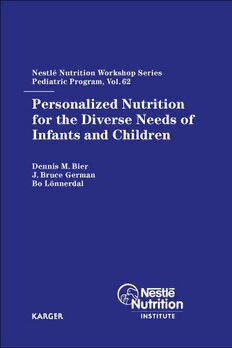
Personalized Nutrition for the Diverse Needs of Infants and Children (Nestle Nutrition Workshop Series: Pediatric Program) PDF
283 Pages·2008·2.047 MB·English
Most books are stored in the elastic cloud where traffic is expensive. For this reason, we have a limit on daily download.
Preview Personalized Nutrition for the Diverse Needs of Infants and Children (Nestle Nutrition Workshop Series: Pediatric Program)
Description:
Research has shown that humans respond differently to diets and, moreover, that they display varying predispositions to many diet-dependent metabolic and degenerative diseases. The focus of nutritional science is thus shifting from dietary guidelines for populations to individualized foods and diets. It is the aim of nutrigenomics to assign this human diversity in nutritional response to diet - as well as the subsequent consequences to human health - to specific genetic elements. At the same time, evidence suggests that diet itself is a critical determinant of human diversity.This publication focuses on the differences of humans as infants and children with respect to nutritional needs and responses to diet. For this purpose, four main points are discussed, namely: how do children differ in view of genetic diversity, environmental inputs, prior imprinting, and resident microflora; what are the immediate and long-term consequences of these differences; can we accurately assess them; and, how can we act on these differences. Supplying answers to some crucial issues, as well as identifying directions for further research and practical applications by the food industry, this publication is an important source of information for all those involved in the subject of diet and individual responses.
See more
The list of books you might like
Most books are stored in the elastic cloud where traffic is expensive. For this reason, we have a limit on daily download.
